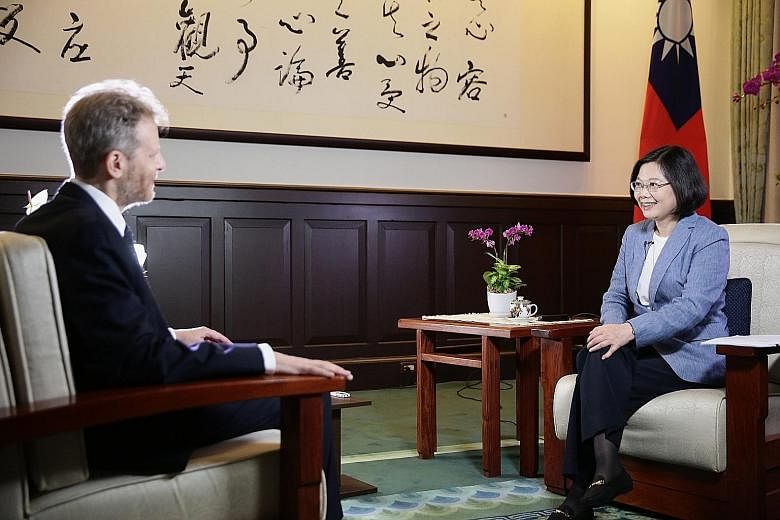TAIPEI • Taiwan will not cave in to pressure that China has ratcheted up on the island in recent months, Taiwanese President Tsai Ing-wen has said in an interview with The Wall Street Journal.
She urged both sides to have a sit-down discussion, but without preconditions.
"It has been a longstanding practice of China to set political preconditions before any meaningful dialogue can be held.
"I think this is obstructive to the development of our relationship," she told the Journal.
She said in comments published on Tuesday: "I also hope that mainland China does not misinterpret or misjudge the current situation, or think that it can make Taiwanese bow to pressure. In a democratic society, this kind of pressure is felt by all.
"No administration in Taiwan is able to make any decision that goes against the opinion of the people."
The Journal's Chinese edition also carried the interview.
Ms Tsai, according to the Journal, chose her words carefully and did not use the phrasing "1992 Consensus" - a tacit agreement between the two sides that there is one China - in her answers.
The 60-year-old former law professor and trade negotiator became Taiwan's first female president following a landslide win in January. Since then, Beijing has stepped up pressure - political, diplomatic, and economic - on the island.
In her inauguration speech on May 20, Ms Tsai did not acknowledge the 1992 Consensus which Beijing has set as the bottom line for continuing cross-strait exchanges.
This angered Beijing, which has since cut official contact and exchanges with Taipei, exerted pressure on international organisations to exclude Taiwan and reportedly also restricted the flow of Taiwan-bound Chinese tourists.
Last week, Ms Tsai, the chairman of the pro-independence Democratic Progressive Party (DPP), sent an open letter to its members, in which she called on them to "resist pressure from China".
She told the Journal on Tuesday that Beijing had displayed a level of "relative reasonableness and calm" after her May 20 inauguration, but recent events showed that it has reverted back to the old ways of "suppression and division".
On the economy, Ms Tsai said that Taiwan must reduce its dependence on mainland China, whose economy has become more competitive, rather than complementary, in relation to Taiwan's.
She added that Taiwan must promote innovation and shift trade and investment to South-east Asia and South Asia.
During the more than hour-long interview, she stressed that Taiwan does not want to return to the "old path of conflict and confrontation".
Cross-strait ties were fraught under the previous DPP administration from 2000 to 2008.
Then President Chen Shui-bian openly backed independence for the island.
Ms Tsai pledged during the interview to maintain the status quo. "Our goodwill is unchanged. But we will not succumb to pressure from China," she said.

